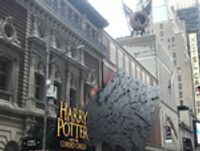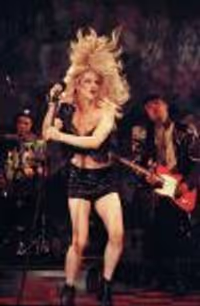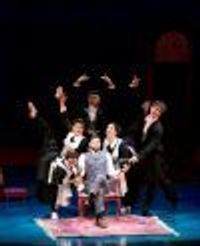Black Billy (Carousel Revival)
#25Black Billy (Carousel Revival)
Posted: 7/10/17 at 12:06pm
I am crazy excited for this production and can't wait to hear Josh Henry and Jessie Mueller sing the score!
As far as the racial dynamic, I think it's going to make for a very thought-provoking, perhaps ambiguous, production. I haven't thought about the domestic abuse, but I was listening to the album the other day, and the beginning of "If I Loved You" really struck me. Billy says something along the lines of, "Ain't you scared of me? Especially after what the cop said about me stealing?" And Julie says something to the effect of, "No, I didn't think nothing about what he said."
That exchange caught me in the context of thinking about this future revival. Billy's reputation will certainly be raced, and Julie's reaction will allow thinking about racial prejudice.
Re: casting a person of color as Julie, I saw an excellent production at the Stratford Festival in Canada in 2015, and Alexis Gordon (a black actress) played Julie opposite a white actor as Billy. I and don't remember being struck by any particular racialized dynamic as accentuated by the text.
#26Black Billy (Carousel Revival)
Posted: 7/10/17 at 1:01pm
This is a musical that is concretely focused on how the larger society and community of a place force a limiting identity onto the humans existing within it (the restrictive rules and roles of the young factory workers who have morality dictated by their economic circumstance (Julie and Carrie), a man being forced by external perceptions into the role of "degenerate" and being trapped by that identity no matter how hard he sacrifices to try to transcend this lot (Billy)). It is a brilliant treatise on the ways society's restrictive ideas of who a person is, and whether they are worth more or less than the people surrounding them, can unfairly and tragic rob them of their humanity and agency.
In today's social climate, this narrative of systemic isolation and belittlement belongs to black men, and it is VITAL that we are allowed to engage with these characters in a way that is contemporaneous to our dialect of social inequity. Also, Joshua Henry is a brilliant actor/singer/performer, outside of anything else. I applaud the producers for his casting, on so many levels.
#27Black Billy (Carousel Revival)
Posted: 7/10/17 at 2:54pm
Good luck trying to find a character worth playing who doesn't have some kind of flaw that someone will complain about. Perhaps Maria von Trapp or Anna Leonowens; it's doubtful that Henry will ever be cast in either, but I would be interested in seeing him try them.
But if one looks hard enough, similar complaints could be found about most roles - Stanley Kowalski (physically and emotionally violent/abusive), Harold Hill, (a criminal), Sweeney Todd (psychotic serial killer).
JSquared2
Broadway Legend Joined: 3/23/17
#28Black Billy (Carousel Revival)
Posted: 7/10/17 at 2:58pm
newintown said: "Good luck trying to find a character worth playing who doesn't have some kind of flaw that someone will complain about. Perhaps Maria von Trapp or Anna Leonowens; it's doubtful that Henry will ever be cast in either, but I would be interested in seeing him try them.
But if one looks hard enough, similar complaints could be found about most roles - Stanley Kowalski (physically and emotionally violent/abusive), Harold Hill, (a criminal), Sweeney Todd (psychotic serial killer)."
Does one REALLY have to "look hard" to find the character flaws in Stanley Kowalski, Harold Hill and/or Sweeney Todd???
#30Black Billy (Carousel Revival)
Posted: 7/10/17 at 8:59pm
With all due respect to wicked_beast4, I don't know where he got the following: "a man being forced by external perceptions into the role of "degenerate" and being trapped by that identity no matter how hard he sacrifices to try to transcend this lot (Billy))". I think it's true that Billy is a perennial outsider, but the idea that he is forced into the role of "degenerate" is more Genet than Hammerstein.
On the contrary, Billy is simply too lazy to do an honest day's work; he is clearly contrasted with the silly, but all-American entrepreneur, Enoch Snow. Billy is willing to be supported by women if it means he doesn't have to do any lifting heavier than flirting with the local factory girls. Even when he resolves to do the right thing and support his child, Billy's solution is to take part in an armed robbery. Rather than take his punishment, in the play (as opposed to the film), Billy commits suicide to avoid prison.
He is redeemed only after death, when he finally learns to feel empathy.
Myself, a white man, I'm not terribly bothered by a black Billy--but only because we have many portrayals of black men nowadays, so no one character stands as a representative of the group. But if one must find a problem, one might better look at Billy's shiftlessness than Billy's domestic violence. The latter is presented as a one-time occurrence; the former is both a stereotype of black men and essential to Billy's character.
#31Black Billy (Carousel Revival)
Posted: 7/11/17 at 12:06am
GavestonPS said: "With all due respect to wicked_beast4, I don't know where he got the following: "a man being forced by external perceptions into the role of "degenerate" and being trapped by that identity no matter how hard he sacrifices to try to transcend this lot (Billy))". I think it's true that Billy is a perennial outsider, but the idea that he is forced into the role of "degenerate" is more Genet than Hammerstein.
On the contrary, Billy is simply too lazy to do an honest day's work; he is clearly contrasted with the silly, but all-American entrepreneur, Enoch Snow. Billy is willing to be supported by women if it means he doesn't have to do any lifting heavier than flirting with the local factory girls. Even when he resolves to do the right thing and support his child, Billy's solution is to take part in an armed robbery. Rather than take his punishment, in the play (as opposed to the film), Billy commits suicide to avoid prison.
He is redeemed only after death, when he finally learns to feel empathy.
Myself, a white man, I'm not terribly bothered by a black Billy--but only because we have many portrayals of black men nowadays, so no one character stands as a representative of the group. But if one must find a problem, one might better look at Billy's shiftlessness than Billy's domestic violence. The latter is presented as a one-time occurrence; the former is both a stereotype of black men and essential to Billy's character."
With all due respect to Gaveston (which I think is limited at best) I think not crediting Hammerstein with the same level of social consciously-crafted work that one would imbue to Genet's work is a disservice to what is clearly (as evidenced by the text) an epic of man's place and value within a larger social order. Look back to how EVERY other character in the play, save for Julie, speaks about Billy (with Aunt Nettie *maybe* as an exception). He is always qualified by the idea of how people see him, as this perjorative lazy, by Mrs. Mullin, by Mr. Bascombe – I mean, as kade.ivy quoted earlier, "Ain't you scared of me? Especially after what the cop said about me stealing?" He then proceeds to wax and twist poetic around the notion of a future where people, and he, could be free of inhibitions and of the way the world expects him to behave, allowing one to fully express the potential of who they want to be not tether to the notions of structured behavior that exists in their world.
Even in the second half, we are left with how the idea of a personal struggle with selfhood and the world, and how the generational associations outside of oneself limit some people while imbue others with a false and inflated sense of worth. Louise is seen by her town, and especially in the scene with the Snows, as her father's daughter, mistrusted, never given a chance to transcend the limits of her father's legacy. Would you ever say that she is lazy, just because she falls into the cycle of her parents and struggles with making the right decisions in her life?
Dig a little deeper into the motivations of "lazy" and "enterprising" – SO much of the show revolves around people making choices within the binary of their social circumstance: Carrie and Julie are parallels, both dreaming of love and freedom, but what those dreams mean to them and how they can be achieved take radically separate routes. Carrie is a kind of conventionalist, seeing an enterprising, active (if a little bit odd) man in Enoch Snow who works within the system that benefits him to achieve success in life, pins onto him those dreams in the hope of moving beyond the factory. Julie is the opposite, wanting freedom, but doesn't want to move through the system and chance being stuck there. She sees Billy, another outsider of sorts, and feels a connection, a kinship in people existing outside of how people think they ought to behave. They don't achieve monetary success or even emotional stability, but there is something in there, that connection, that mutual struggle or dissatisfaction with the world, that shows them they are not alone ("What's the use of wonderin'"![]() . I mean, that song paints a picture clear as day that it isn't about about the binary, about being good or bad, it is the penumbral in-between that defines us and makes us human, even in the direst of interpersonal straits.
. I mean, that song paints a picture clear as day that it isn't about about the binary, about being good or bad, it is the penumbral in-between that defines us and makes us human, even in the direst of interpersonal straits.
I'm not arguing that Billy is some white knight crusading for goodness in the world, but a categorical dismissal of his behavior as lazy or shiftless, and ESPECIALLY the aligning of those characteristic of stereotypes of black men, are EXACTLY what is wrong with how people conceive of identity and agency – the world doesn't present every person with equitable terrain, and as two white men, GavestonPS, you and I certainly do not have a right to be the arbitor of that discussion. People are not lazy "just because" – every human being is the product of their own distinct life experiences, and we behave in the ways that we do because of them. If Billy's solution is to take part in armed robbery, ESPECIALLY after the struggle that is Soliloquy, it is NOT because he is a bad person – what options are left for him? This is what the world has taught his as an option for survival because it has told him that that's what he is and what he is worth. To conflate so-called listlessness that is onset by the unequal social mores with some fundamental notion of "character", and then to connect that so-called "listlessness" to a black male stereotype is foolish at best, and ignorant-bordering-on-reductive at worst.
#32Black Billy (Carousel Revival)
Posted: 7/11/17 at 1:06am
If your respect is so begrudging, wicked, best keep it to yourself. I spent as many years in grad school as you did.
I said nothing about any actual African American, historical or current. I merely referred to one, Anglo-American, construction of blackness, one which is on display every time a GOP pol makes a speech.
What does Billy do to change his economic or social status (except commit a crime)? We know what Enoch does. The course of the Snows through the play precisely refutes your vision of the world of CAROUSEL as one where society dictates character without allowing for mobility. How do you think they get to the place where they can look down on Louise?
We know Julie defies the moral conventions assigned to factory girls, despite her initial protestations about "seeing to" her reputation. Meanwhile, Billy takes a temper tantrum (as he always does when he doesn't get his way) and quits his good-paying job. If the famous bench scene isn't an argument that character comes from within rather than being imposed from without, I don't know what.
This isn't to say Hammerstein is "less socially conscious" than Genet; the former was a liberal activist in his day and on his terms. But Billy Bigelow or Jud Fry, Hammerstein doesn't see character as strictly constructed by social circumstances, not as much as you (or I) might see it. He's much more concerned with constructions of gender; regardless of their race or social status, his male characters are reprobates who need to be tamed and improved by the love of a selfless woman.
But I'll give you Rolf. He probably wouldn't become a Nazi if he weren't living in German-occupied territory.
ETA to add I don't think you and I need to quarrel about this. If you were to tell me you were directing CAROUSEL and planned to give your social construction theories to the actor playing Billy to use as subtext, I would applaud the richness of your vision. I don't think that is exactly what Hammerstein intended, but neither do I think it will tear the fabric of the play.
My point was more that Billy can be played and/or read as "shiftless" in a way that is akin to an unfortunate stereotype of African Americans. (It's a particularly galling stereotype to me because so much of this country's wealth was built on the free labor of African slaves.) One might well argue that casting a black actor in the role risks reinforcing the ugly stereotype.
But we have lots of hard-working African American lawyers, doctors and police officers on TV and film. The likelihood that any one portrayal will be seen to stand in for all black people seems much less than it once did. (To take a parallel example, I was highly offended by portrayals of gays and lesbians as serial killers back when we could only be portrayed as killers or victims of killers. Now that we have all sorts of gay representations in every medium, I don't mind the occasional queer psycho now and then.)
#33Black Billy (Carousel Revival)
Posted: 7/11/17 at 1:40pm
I tend to be a pretentious fop when it comes to my very particular interpretation of a work that, although I could argue is evidenced by the text, is absolutely not inherent to it. My apologies for what I now amount to a late-night rant.
I deeply appreciate your thoughtful and well-reasoned response – indeed, although I let myself get a little more heated that appropriate, this kind of thoughtful critical exchange is what I wish this board could accomplish more frequently, and I'm grateful for your willingness to engage. Bridging the interpretive gap between a text-based forum and intended meaning, I see that now I'm, for the most part, in agreement with your logic, albeit engaging from a different angle.
And I can guarantee you've spent more years in grad school than I – I just have a habit of self-righteousness that I've yet to shake...
#34Black Billy (Carousel Revival)
Posted: 7/11/17 at 2:00pm
You guys are giving A8 an aneurism with such a self-aware and lofty conversation. :)
#35Black Billy (Carousel Revival)
Posted: 7/11/17 at 2:04pm
I adore this conversation. Makes me wish I had examined Carousel more recently and could have my own current opinions, but even without that, it's wonderful. This is real crit. I love it.
Owen22
Broadway Legend Joined: 2/24/11
#36Black Billy (Carousel Revival)
Posted: 7/11/17 at 7:52pm
wicked_beast4 said: "GavestonPS said: "With all due respect to wicked_beast4, I don't know where he got the following: "a man being forced by external perceptions into the role of "degenerate" and being trapped by that identity no matter how hard he sacrifices to try to transcend this lot (Billy))". I think it's true that Billy is a perennial outsider, but the idea that he is forced into the role of "degenerate" is more Genet than Hammerstein.
On the contrary, Billy is simply too lazy to do an honest day's work; he is clearly contrasted with the silly, but all-American entrepreneur, Enoch Snow. Billy is willing to be supported by women if it means he doesn't have to do any lifting heavier than flirting with the local factory girls. Even when he resolves to do the right thing and support his child, Billy's solution is to take part in an armed robbery. Rather than take his punishment, in the play (as opposed to the film), Billy commits suicide to avoid prison.
He is redeemed only after death, when he finally learns to feel empathy.
Myself, a white man, I'm not terribly bothered by a black Billy--but only because we have many portrayals of black men nowadays, so no one character stands as a representative of the group. But if one must find a problem, one might better look at Billy's shiftlessness than Billy's domestic violence. The latter is presented as a one-time occurrence; the former is both a stereotype of black men and essential to Billy's character."
With all due respect to Gaveston (which I think is limited at best) I think not crediting Hammerstein with the same level of social consciously-crafted work that one would imbue to Genet's work is a disservice to what is clearly (as evidenced by the text) an epic of man's place and value within a larger social order. Look back to how EVERY other character in the play, save for Julie, speaks about Billy (with Aunt Nettie *maybe* as an exception). He is always qualified by the idea of how people see him, as this perjorative lazy, by Mrs. Mullin, by Mr. Bascombe – I mean, as kade.ivy quoted earlier, "Ain't you scared of me? Especially after what the cop said about me stealing?" He then proceeds to wax and twist poetic around the notion of a future where people, and he, could be free of inhibitions and of the way the world expects him to behave, allowing one to fully express the potential of who they want to be not tether to the notions of structured behavior that exists in their world.
Even in the second half, we are left with how the idea of a personal struggle with selfhood and the world, and how the generational associations outside of oneself limit some people while imbue others with a false and inflated sense of worth. Louise is seen by her town, and especially in the scene with the Snows, as her father's daughter, mistrusted, never given a chance to transcend the limits of her father's legacy. Would you ever say that she is lazy, just because she falls into the cycle of her parents and struggles with making the right decisions in her life?
Dig a little deeper into the motivations of "lazy" and "enterprising" – SO much of the show revolves around people making choices within the binary of their social circumstance: Carrie and Julie are parallels, both dreaming of love and freedom, but what those dreams mean to them and how they can be achieved take radically separate routes. Carrie is a kind of conventionalist, seeing an enterprising, active (if a little bit odd) man in Enoch Snow who works within the system that benefits him to achieve success in life, pins onto him those dreams in the hope of moving beyond the factory. Julie is the opposite, wanting freedom, but doesn't want to move through the system and chance being stuck there. She sees Billy, another outsider of sorts, and feels a connection, a kinship in people existing outside of how people think they ought to behave. They don't achieve monetary success or even emotional stability, but there is something in there, that connection, that mutual struggle or dissatisfaction with the world, that shows them they are not alone ("What's the use of wonderin'"![]() . I mean, that song paints a picture clear as day that it isn't about about the binary, about being good or bad, it is the penumbral in-between that defines us and makes us human, even in the direst of interpersonal straits.
. I mean, that song paints a picture clear as day that it isn't about about the binary, about being good or bad, it is the penumbral in-between that defines us and makes us human, even in the direst of interpersonal straits.
I'm not arguing that Billy is some white knight crusading for goodness in the world, but a categorical dismissal of his behavior as lazy or shiftless, and ESPECIALLY the aligning of those characteristic of stereotypes of black men, are EXACTLY what is wrong with how people conceive of identity and agency – the world doesn't present every person with equitable terrain, and as two white men, GavestonPS, you and I certainly do not have a right to be the arbitor of that discussion. People are not lazy "just because" – every human being is the product of their own distinct life experiences, and we behave in the ways that we do because of them. If Billy's solution is to take part in armed robbery, ESPECIALLY after the struggle that is Soliloquy, it is NOT because he is a bad person – what options are left for him? This is what the world has taught his as an option for survival because it has told him that that's what he is and what he is worth. To conflate so-called listlessness that is onset by the unequal social mores with some fundamental notion of "character", and then to connect that so-called "listlessness" to a black male stereotype is foolish at best, and ignorant-bordering-on-reductive at worst.
Boy, this guy likes to hear himself type....
"
#37Black Billy (Carousel Revival)
Posted: 7/12/17 at 2:29am
Thank you so much for that gracious response, wicked. It was particularly gratifying because I wrote the post before it about six times before I was satisfied that it was sufficiently civil. It was in the process of doing so that I realized you and I don't disagree so very much.
***
Owen22 said: "
Boy, this guy likes to hear himself type....
"
To be fair to wicked_beast4, he was responding to a lengthy post from me. We were both typing late at night. LOL.
Videos








